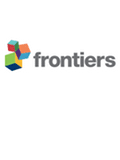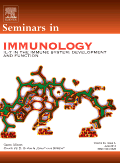
EUROPEAN JOURNAL OF IMMUNOLOGY
Scope & Guideline
Advancing Immunology Through Pioneering Research
Introduction
Aims and Scopes
- Immunological Mechanisms in Disease:
The journal focuses on understanding the underlying immunological mechanisms associated with various diseases, including cancer, autoimmune disorders, and infectious diseases. Research often investigates how immune responses can contribute to the pathogenesis of these conditions. - Biomarker Discovery and Validation:
A significant emphasis is placed on identifying and validating biomarkers for disease diagnosis, prognosis, and therapeutic targets. This includes studies on cytokines, immune cell populations, and genetic markers that can provide insights into disease mechanisms. - Therapeutic Approaches in Immunology:
The journal publishes research on novel therapeutic strategies, including immunotherapy and the use of biologics. This includes studies on the efficacy of new treatments and their mechanisms of action in various immunological contexts. - Translational Research:
Research that bridges basic immunological science with clinical applications is a core focus. This includes studies that translate laboratory findings into potential clinical interventions, highlighting the practical implications of immunological research. - Immune Response to Infectious Diseases:
The journal covers the immune response to various infectious agents, including viruses, bacteria, and parasites. This includes research on vaccine development, immune evasion strategies employed by pathogens, and the role of the immune system in controlling infections.
Trending and Emerging
- Immunotherapy and Cancer Research:
There is an increasing focus on immunotherapy, particularly in the context of cancer treatment. Research exploring novel immune checkpoint inhibitors, CAR T-cell therapies, and combination strategies is on the rise, reflecting the growing importance of harnessing the immune system to combat cancer. - COVID-19 and Its Immunological Impact:
The pandemic has catalyzed a surge in research related to COVID-19, including studies on immune responses to the virus, vaccine efficacy, and long-term immunological effects post-infection. This theme is expected to remain prominent as the global health landscape continues to evolve. - Microbiome and Immune Interactions:
Emerging research is increasingly exploring the relationship between the microbiome and the immune system, highlighting how gut health influences immune responses and disease outcomes. This area is gaining traction as researchers look for novel therapeutic strategies. - Personalized Medicine in Immunology:
There is a growing trend towards personalized approaches in immunology, with studies focusing on how individual genetic, environmental, and lifestyle factors influence immune responses, thereby tailoring interventions to enhance efficacy. - Chronic Inflammation and its Role in Disease:
Research investigating the role of chronic inflammation in various diseases, including autoimmune disorders and metabolic syndromes, is gaining momentum, as scientists seek to understand the long-term consequences of immune dysregulation.
Declining or Waning
- Traditional Vaccine Research:
While vaccine research remains important, there appears to be a waning emphasis on traditional vaccine development studies, particularly in comparison to the surge of interest in mRNA and novel vaccine platforms that have emerged due to the COVID-19 pandemic. - Basic Immunology without Clinical Relevance:
Research that focuses solely on basic immunological mechanisms without direct clinical applications or implications has become less frequent, as there is a growing demand for studies that can translate findings into clinical practice. - Single Disease Focus Studies:
There has been a noticeable decrease in studies that focus exclusively on a single disease without considering broader immunological contexts or comparative studies across different conditions, as interdisciplinary approaches gain favor.
Similar Journals

Immunity Inflammation and Disease
Elevating the discourse on therapeutic strategies for inflammatory diseases.Immunity, Inflammation and Disease is a premier open-access journal published by WILEY, dedicated to advancing the field of immunology and allergy. Launched in 2013, this journal has established itself as a significant platform for researchers and professionals to disseminate high-quality research findings and innovative insights that address critical issues in immune responses and inflammatory diseases. With an impact factor that reflects its growing influence and a current ranking in Q3 for Immunology and Q2 for Immunology and Allergy, this journal serves a diverse audience keen on exploring cutting-edge developments. Researchers are encouraged to submit their work to share their findings with a global reach, foster collaboration, and enhance the understanding of immune mechanisms and therapeutic strategies. Accessible since its inception, Immunity, Inflammation and Disease is committed to open science, ensuring that vital research is freely available for the advancement of knowledge within the academic community and beyond.

HUMAN IMMUNOLOGY
Championing Research in Allergy and ImmunologyHUMAN IMMUNOLOGY, published by Elsevier Science Inc, serves as a critical platform for disseminating research in the fields of immunology and allergy, as well as various aspects of miscellaneous medicine since its inception in 1980. With an ISSN of 0198-8859 and E-ISSN 1879-1166, this journal is pivotal for researchers and practitioners looking to advance their understanding of human immune responses and related conditions. The journal currently holds a respectable position within its field, as highlighted by its 2023 Scopus ranks—#114/233 in Immunology and Allergy and #132/236 in Immunology and Microbiology. Moreover, it maintains a Q2 quartile ranking in both Immunology and Allergy and miscellaneous Medicine, underscoring its influence and reach within the scientific community. Although it does not currently offer Open Access options, HUMAN IMMUNOLOGY remains dedicated to providing valuable insights and fostering academic discourse within its discipline, characterized by a rigorous peer-review process and a focus on innovative research trajectories.

JOURNAL OF IMMUNOLOGY
Advancing Immunological FrontiersWelcome to the JOURNAL OF IMMUNOLOGY, a prestigious publication associated with the American Association of Immunologists and dedicated to advancing the field of immunology. With a rich history dating back to 1945, this journal is renowned for its high-impact research, evident in its notable 2023 Q1 rankings in both Immunology and Allergy, as well as its strong positions in Scopus rankings—Rank #68 in Immunology and Allergy and Rank #79 in Immunology and Microbiology. Although it operates on a subscription basis, its commitment to publishing cutting-edge studies ensures that it remains a vital resource for scientists, healthcare professionals, and students alike. As the journal continues to pave the way for innovative research and breakthroughs in immunological science, it facilitates a platform for dialogue and discovery among researchers and practitioners across the globe.

PARASITE IMMUNOLOGY
Fostering Collaboration in Immunology and Parasitology.PARASITE IMMUNOLOGY, published by Wiley, is a leading journal in the field of immunology and parasitology, with an ISSN of 0141-9838 and E-ISSN of 1365-3024. Since its inception in 1979, it has played a pivotal role in advancing our understanding of host-parasite interactions, immunological responses to parasitic infections, and the mechanisms of immunological resistance. The journal is adeptly positioned within the academic community, currently holding a prestigious Q2 ranking in Parasitology and a Q3 ranking in Immunology for 2023, indicating its significant influence and relevance. Its comprehensive scope attracts a diverse readership, contributing to the discourse surrounding novel therapeutic approaches and emerging challenges in parasitic diseases. With a consistent convergence of research until 2024, PARASITE IMMUNOLOGY is an essential resource for researchers, professionals, and students seeking to deepen their knowledge and foster collaboration in these dynamic fields. Although it is not an open-access journal, the insights shared within its pages are invaluable for shaping future research trajectories.

Immunotherapy Advances
Transforming patient care through innovative immunotherapeutic insights.Immunotherapy Advances, published by Oxford University Press, stands at the forefront of the rapidly evolving field of immunology and microbe interactions, focusing specifically on novel immunotherapeutic strategies and their clinical applications. Established in 2021, this peer-reviewed journal aims to disseminate high-quality research that contributes to the understanding and advancement of immunotherapeutic techniques, potentially transforming patient care in immunology. With a current Scopus rank of #140 out of 236 in the realm of Immunology, placing it in the 40th percentile, Immunotherapy Advances is positioned to be an integral resource for researchers, healthcare professionals, and students eager to stay updated with groundbreaking findings and methodologies. The journal is dedicated to fostering innovative discussions and collaborations, ensuring open access to vital research that influences treatment paradigms globally.

IMMUNOBIOLOGY
Connecting researchers to revolutionize the understanding of immune systems.IMMUNOBIOLOGY is a prestigious academic journal published by Elsevier GmbH that significantly contributes to the fields of hematology and immunology. With its ISSN 0171-2985 and E-ISSN 1878-3279, this journal has been disseminating impactful research since 1979, positioning itself at the forefront of immunological and hematological advances. The journal holds a commendable ranking of Q2 in Hematology and Q3 in both Immunology and Immunology and Allergy, indicating its relevance and influence within the scientific community, as reflected by its Scopus rankings. Although IMMUNOBIOLOGY operates under a subscription model, it remains dedicated to expanding knowledge across disciplines, fostering innovative research, and facilitating connections among researchers, professionals, and students. Situated in Munich, Germany, this journal is continually evolving and aims to remain an essential resource for the latest discoveries and insights in the realms of immunity and blood disorders, ultimately enhancing our understanding of complex biological systems.

ImmunoTargets and Therapy
Fostering Global Collaboration in ImmunologyImmunoTargets and Therapy is a leading open access journal published by DOVE MEDICAL PRESS LTD, dedicated to advancing the field of immunology and its various therapeutic applications. Since its inception in 2012, the journal has rapidly become a vital resource for researchers, professionals, and students, achieving notable recognition with a Q1 ranking in both Immunology and Immunology and Allergy categories as of 2023. With an impressive Scopus ranking of #22 out of 233 in Medicine - Immunology and Allergy, and #25 out of 236 in Immunology and Microbiology, this journal maintains a 90th percentile standing in its field. ImmunoTargets and Therapy not only publishes original research articles, reviews, and clinical studies, but also fosters an inclusive platform for the dissemination of innovative findings critical to the fight against immunological disorders. Based in New Zealand, it serves a global audience, promoting knowledge exchange and collaboration through its open access model.

International Immunopharmacology
Unlocking the Potential of Immune Modulation and TherapeuticsInternational Immunopharmacology, published by Elsevier, stands as a prominent journal within the disciplines of immunology and pharmacology. With an ISSN of 1567-5769 and an E-ISSN of 1878-1705, this esteemed journal is based in the Netherlands and features a robust commitment to disseminating high-quality research from its inception in 2001 through 2024. The journal has achieved impressive rankings, securing a Q1 category in Pharmacology and Q2 in both Immunology and Immunology and Allergy as of 2023. With its strategic focus on bridging the gap between immunology and pharmacological applications, International Immunopharmacology attracts a diverse readership, including researchers, healthcare professionals, and students interested in the latest advancements in therapeutic agents and immune system modulation. Furthermore, it offers an open access option, enhancing the accessibility and reach of its invaluable content. As a pivotal resource in the field, this journal not only facilitates the exchange of innovative ideas but also fosters a deeper understanding of the complexities of immunopharmacology in today’s research landscape.

Frontiers in Immunology
Fostering Collaboration in the World of Immunological DiscoveryFrontiers in Immunology is a leading open-access journal published by FRONTIERS MEDIA SA since 2010, dedicated to advancing knowledge in the field of immunology. With an impressive Q1 ranking in both Immunology and Allergy as of 2023, this journal exemplifies excellence in research dissemination, positioning itself among the top 22% of relevant literature in the discipline. The journal, based in Switzerland, emphasizes its commitment to open science by ensuring all published research is freely accessible, fostering collaboration and innovation among researchers, professionals, and students alike. With substantial visibility demonstrated by its ranks within the Scopus database—ranked #52 out of 233 in Immunology and Allergy, and #58 out of 236 in Immunology and Microbiology—Frontiers in Immunology serves as a vital platform for cutting-edge research. Researchers are invited to contribute original investigations and reviews that expand the understanding of immune mechanisms, therapeutic advancements, and clinical applications, making it a cornerstone for those looking to push the boundaries of immunological science.

SEMINARS IN IMMUNOLOGY
Exploring the Depths of Immune ScienceSEMINARS IN IMMUNOLOGY, published by Academic Press Ltd - Elsevier Science Ltd, stands as a leading journal in the field of immunology and allergy, with an impressive impact factor that reflects its significant contribution to advancing research and discourse within these vital areas of medical science. Established in 1989, this esteemed journal has garnered a reputation for disseminating high-quality, peer-reviewed articles that span a broad spectrum of immunological topics, making it an essential resource for researchers, healthcare professionals, and students alike. Currently ranked Q1 in both Immunology and Allergy categories, SEMINARS IN IMMUNOLOGY ranks 39th among 233 journals in Immunology and Allergy and 43rd among 236 in Immunology and Microbiology according to Scopus, placing it in the 83rd and 81st percentiles respectively. This underscores its pivotal role in shaping the future of immunological research and clinical practices. While the journal operates under a subscription model with no open access option, it remains committed to providing comprehensive insights and fostering scholarly collaboration within the global immunology community.